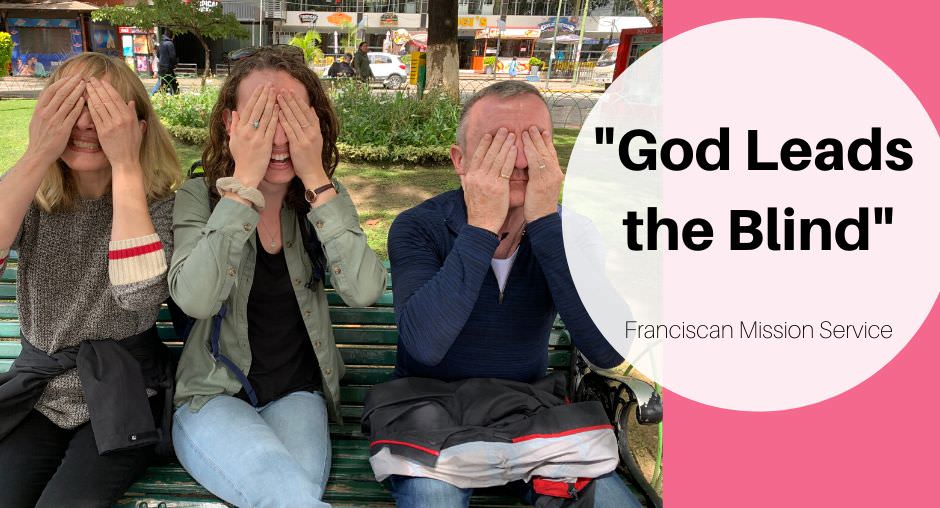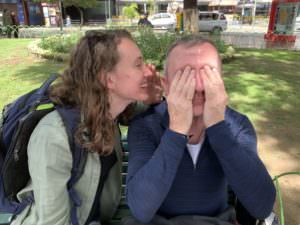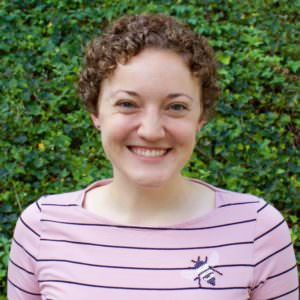God Leads the Blind

Editor’s note: Missioner Anna has just begun her journey in Bolivia and reflects on the ways her experiences on mission so far are teaching her how to really listen.
In my last blog post, I spoke of the true Spirit of Christmas, the Holy Spirit. The Holy Spirit prompts us to speak to others. While the Spirit continually asks me to speak to those who are put in my path each day, more recently, I am being called to listen. Speaking is important to communicate with those around us and to share the message of Christ, but arguably, listening is just as important, if not more.
As I enter into a new culture and new community, I find myself listening first. I don’t know the customs and practices of Bolivia, so I must first watch and listen. By living with a host family and eating all meals with my host mom, I learned that here in Bolivia, before getting up from the table, you always say “gracias” and “provecho.” By riding in the car with my host sister and listening to her talk about traffic, I learned the word for stoplight: semáforo. One can learn a great deal by listening.
 So often in our US culture, we speak before we think or listen. This can be admirable as it is important to be one’s authentic self and speak one’s mind, but it can also hinder relationships if it is taken too far. For where I am now, I am not in a position where I am able to speak before listening. While my Spanish is great, there is still much to learn! With learning comes listening, and I realize this every day I am in language class at the MaryKnoll Institute in Cochabamba.
So often in our US culture, we speak before we think or listen. This can be admirable as it is important to be one’s authentic self and speak one’s mind, but it can also hinder relationships if it is taken too far. For where I am now, I am not in a position where I am able to speak before listening. While my Spanish is great, there is still much to learn! With learning comes listening, and I realize this every day I am in language class at the MaryKnoll Institute in Cochabamba.
Here, I am learning Quechua, an indigenous language spoken in Bolivia. However, my professors only speak Quechua and Spanish. Therefore, I am learning a third language by using my second language. My brain is working extra hard to learn the language of Quechua. Each day, I listen very carefully to what my professors are saying. If I were learning in English, I could multi-task or only pay half attention to what my professors are saying and still be able to catch on to the material. But, this is not the case! I must focus all my attention on listening to my professors so that I can best learn the language of Quechua. By listening, I pick up on nuances and words that I didn’t know before.
Now that I am learning Quechua, my brain has three languages twirling around inside. For each single word one knows in their native language, I now know at least two other words with the same meaning. For this reason, I have to concentrate very hard on what I am hearing or what I want to say. When listening to my professors speak, I often close my eyes so that I can concentrate on my sense of hearing. It helps me to listen more attentively. I often do the same when speaking in Quechua. I close my eyes to concentrate and see the words in my mind. When I first noticed myself closing my eyes during class, I thought… how much better I understand my professor when my sense of sight is taken away! For the first time, I started to imagine what it would be like to be blind.
If I were blind, I wouldn’t have a choice but to listen first. I wouldn’t always know when someone else is around, and therefore I wouldn’t necessarily have the option to be the first one to speak. I would need to listen to hear someone else talking to me and inviting me to enter into conversation. The same would be true when learning a new culture or way of community life. I wouldn’t be able to see with my own eyes to judge for myself what is happening around me or make assumptions about the people and practices taking place. Rather, I would listen to conversations to learn about the customs and culture of a new place. In turn, I would have greater faith in those around me. I would have faith that they are teaching me what I need to know, and I would learn solely by listening. Here is born the term “blind faith.”
Blind faith is what led me here to this moment where I find myself in Bolivia as a Franciscan Missioner. A year and a half ago, I wasn’t sure where the Lord was leading me. But I trusted in blind faith that He would lead me where I needed to be by listening. I actively listened as I sat in silence to hear where God called me. As God promised Isaiah…
“I will lead the blind by ways they have not known, along unfamiliar paths I will guide them; I will turn the darkness into light before them and make the rough places smooth. These are the things I will do; I will not forsake them,” (Isaiah 42:16)
…so He also promises me. I was blind when discerning mission, and God led me here to Bolivia, a place I have not known. When I left Kentucky, I was sad and in darkness for I missed my family. Yet, He has already turned that darkness into light by providing me with an amazing host family here. There will come rough patches during my time on mission, but I have confidence the Lord will smooth those over, too. He has promised, and He will not leave me.
The Lord promised Isaiah; He promised me; and He promises YOU! If you only trust in blind faith, the Lord will teach you. But don’t be completely blind to what’s around you, keep your ears open so you may listen and learn. Listening and learning is crucial for me to thrive in a new country, and it is also crucial for you to thrive where you are now! Don’t let the mundane routine cause you to become deaf to those around you. Cultivate an attitude and posture of listening without a desire to speak, and you will be surprised at what you learn daily. Truly listen and learn more about your dearest friends, your closest family, your coworkers, and the strangers you encounter each day. And if you must, close your eyes and be blind! ☺ For, that’s what I must do, too, when learning Quechua here in Bolivia!
Reflection: How can you be more attentive to others? What do you hear? Who do you see?
Tagged in:

